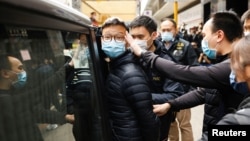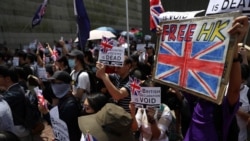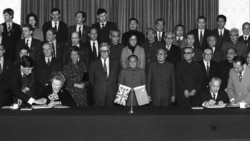On June 19, China put up a lengthy response to a speech by Secretary of State Antony Blinken’s summarizing U.S. policy on China.
Blinken had criticized China’s Communist Party for growing “more repressive at home and more aggressive abroad.” While stressing that the U.S. was not seeking conflict, he called out Beijing for human rights abuses and quashing of freedoms in Xinjiang, Hong Kong and Tibet.
Beijing’s 25,645-word rebuttal pushed back on numerous themes. This one caught our attention:
“During the 150-plus years of British colonial rule, there was no democracy in Hong Kong whatsoever. None of the governors was democratically elected by Hong Kong residents…
“… In stark contrast, after the return of Hong Kong [to China, its residents] … manage their own affairs within the scope of the high degree of autonomy. They enjoy a wide range of democratic rights and freedoms like never before.”
This is false. In fact, Hong Kong leaders under China’s control systematically crushed the pro-democracy movement there while instituting a faux-democratic system manipulated by Beijing.
As Polygraph.info previously reported, Beijing reneged on its original promise to grant Hong Kong a “high degree of autonomy” after the British agreed to return the colony.
In recent years, pro-Beijing politicians put down protests and passed a sweeping national security law that provides wide power to punish dissent.
Pro-democracy candidates were disqualified; pro-democracy activists and lawmakers were arrested; and pro-democracy publications were closed and their journalists harassed and jailed.
Beijing chipped away at Hong Kong residents’ limited voting rights to allow only “patriotic” candidates and introduced “patriotic” textbooks that rewrote history to favor Beijing.
One could argue that Hong Kongers’ “democratic rights and freedoms” have been stripped away “like never before.”
China’s antipathy for true democracy goes back further. Although it’s true that Hong Kong was not a democracy under the British, that might have changed had China not opposed efforts at a democratic transition.
Hong Kong was a British colony for a century and a half starting in 1841 (except for the period of Japanese occupation from 1941 to 1945). Its colonial status was governed by treaties signed with the Qing Dynasty, China’s last.
After communists seized power in 1949, China said it never recognized the “unequal treaties” with the Qing Dynasty. Instead, Beijing viewed the British occupation as illegal and insisted it had sovereignty over Hong Kong.
Negotiations in the latter 20th century eventually led to a “one country, two systems” arrangement under the 1984 Sino-British Joint Declaration registered with the United Nations. China was supposed to grant Hong Kongers autonomy for 50 years.
Colonial records declassified by the British government over the past decade showed that the British had thought about granting Hong Kong self-governance in the 1950s. Direct elections were even considered in the 1960s and ’70s, according to the Washington Post.
However, Communist China under the leadership of Mao Zedong quashed the idea, warning Britain to “preserve the colonial status of Hong Kong,” according to the declassified documents.
As The Atlantic magazine reported in 2014, one of those documents describes how, in 1958, then Chinese Premier Zho Enlai told a senior British military official that, “Beijing would regard allowing Hong Kong’s people to govern themselves as a ‘very unfriendly act’.”
The Atlantic added that in 1960, Liao Chengzhi, who was China’s director of “overseas Chinese affairs,” told Hong Kong union representatives “that China’s leaders would ‘not hesitate to take positive action to have Hong Kong, Kowloon and the New Territories liberated’ if the Brits allowed self-governance.”
“Beijing can no longer say there were bad things during colonial times because it’s now been revealed that it was part of the force that maintained the status quo in Hong Kong,” Ho-Fung Hung, a sociology professor at Johns Hopkins University, told The Atlantic.
“Beijing is partially responsible for the lack of democracy in Hong Kong before 1997,” Hung said.
In fact, direct elections were briefly introduced in Hong Kong, though only for a limited number of seats in the local legislature, during the last few years of its colonial status.
“It’s long been known that in the 1980s, once the Brits knew they were going to be leaving Hong Kong and tried to speed up democratic reform, the Chinese government threatened them not to,” Hung told The Atlantic.







